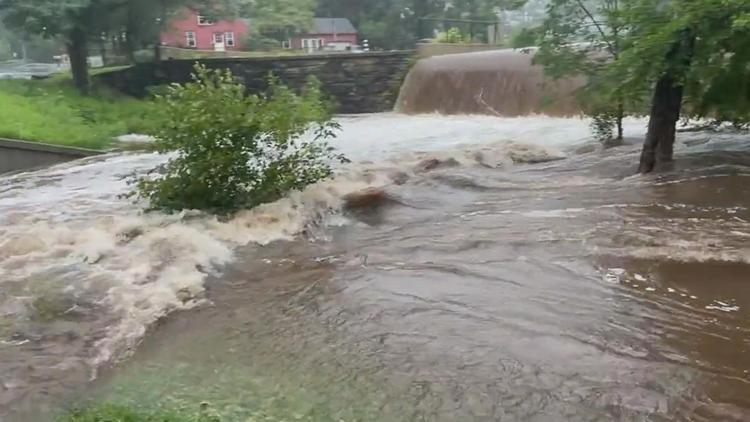HARTFORD, Conn. — The remnants of Ida are making their way to New England, triggering flood warnings for an already rain-soaked Connecticut.
Meteorologists say that residents across Connecticut must prepare as the storm continues its approach toward the state. Rain from the system started Wednesday morning and is expected to go through early Thursday.
The American Red Cross offered some tips for residents as the storm slowly approaches.
- Create an evacuation plan. Make sure you and everyone in your groups know where to go in case of an emergency.
- Build an emergency kit. This should include a gallon of water per person, per day, non-perishable foods, masks, flashlight, first aid kit, and a battery-powered radio. If one already has an emergency kit, check it to make sure everything is up to date.
- Be informed. Make sure you know how local officials will contact the public, whether it is TV, phone, or even radio.
- Download the free Red Cross Emergency App to help keep you and your loved ones safe with real-time alerts, open Red Cross shelter locations, and safety advice on hurricanes and other emergencies.
Fairfield-based Save the Children says parents can help their kids prepare by talking about the storm and explaining that the natural event is not anyone’s fault. It's also important to reassure children of plans in place to keep them safe.
Additionally, filling out contact cards and packing go-bags are important in case of emergencies.
The Town of West Hartford provided tips on how to stay safe as well when Tropical Storm Henri approached, which also dumped inches of rain on the state:
- Bring in lawn furniture, umbrellas, canopies, or anything that can blow away and cause damage.
- Have cash on hand in case ATMs or credit card machines are not functioning.
- Gas your vehicles.
- Stock your freezer with ice. Ice will be in short supply so consider making your own now.
- Stock up on non-perishable food.
- Make sure your pets have enough food for several days.
- If you can, clear debris from the top of a catch basin near your home to reduce flooding.
Here are some tips officials provided that can help residents prepare at home to keep their tech dry and their families safe and connected ahead of the storm.
Keep devices dry: Store phones, tablets, batteries, chargers and other equipment in a dry, accessible location. Plastic zipper storage bags will shield devices, and there are weatherproof phones, phone cases and other protective accessories available.
Keep devices fully charged: Plan ahead by keeping phone and tablet batteries fully charged in case local power is lost.
Review checklists: Review the hurricane preparedness checklist, power outage checklist and other resources from the American Red Cross.
Get some backup: Keep spare batteries charged up to provide backup power. And have car chargers on hand in case you need to evacuate.
Create a list: Maintain a list of emergency numbers–police and fire departments; power and insurance companies; family, friends and co-workers; etc.–and program them into your wireless devices before an emergency arises.
Be prepared for loss: Use your tablet to photograph and catalog your valuables and other household belongings for possible insurance claims
Download useful apps: Hundreds of free weather, news, and safety-related apps and services are available through your device’s app store. These include several apps from the American Red Cross for iOS and Android, mobile weather reports from the National Weather Service, and many, many more.
COVID-19 considerations: In the event of an evacuation, bookmark your local emergency resources on your phone so you can research any special restrictions, limitations or instructions if you need emergency shelter, medical care or other support that may be impacted by COVID-19.
The United Services Automobile Association (USAA) also issued tips on how to stay safe:
- Put important financial, medical, and legal documents in a safe place. Use a fire-proof safe and have digital backups. Keep records of all additional expenses. Homeowners' insurance policies generally provide coverage for additional living expenses if you have covered damage to your home.
- If there is property damage, photograph debris or destroyed items before having them removed or repaired.
- Beware of contractors who ask for a large amount of money upfront and contractors whose bids are very low as they may cut corners and leave with problems after they're gone.
- Make sure contractors are qualified, license, and insured.
Follow the FOX61 weather page or on the FOX61 News app for the latest forecast.
HERE ARE MORE WAYS TO GET FOX61 NEWS
Download the FOX61 News APP
iTunes: Click here to download
Google Play: Click here to download
Stream Live on ROKU: Add the channel from the ROKU store or by searching FOX61.



